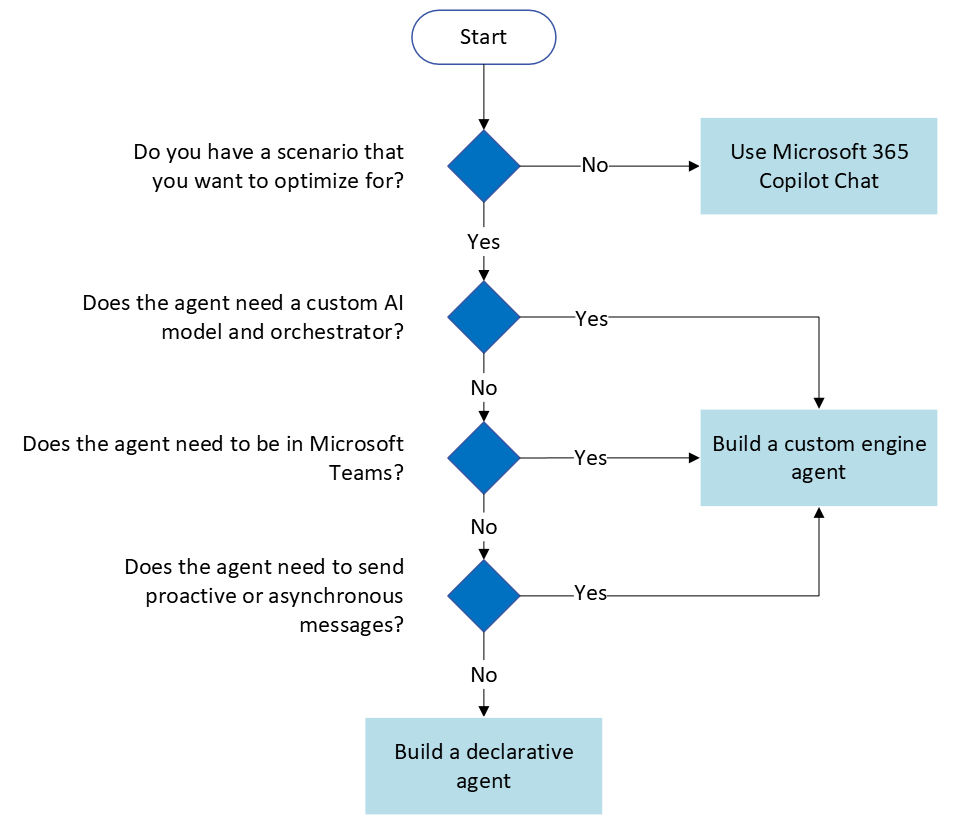When to use custom engine agents
Here, we discuss how you can decide whether a custom engine agent is the right choice for building an agent in Microsoft 365. We list some criteria that indicate whether a custom engine agent meets your needs.
Decision criteria
Custom engine agents help you build agents in Microsoft 365. The cases where custom engine agents might not be the best option typically involve the need for custom user experience and where the model and orchestrator provided by Microsoft 365 Copilot are sufficient for your needs. Here's some discussion on factors that you should consider when deciding to build custom engine agents.
| Factor | Description |
|---|---|
| Scenario | The key question to ask when you're considering custom engine agents is 'what is the scenario I'm optimizing for?', if you don't have a scenario you need to optimize for, then a custom engine agent probably isn't the best option. Consider using Microsoft 365 Copilot Chat. |
| AI model, and orchestrator | The next consideration is whether the model, orchestrator, and responsible AI controls provided by Microsoft 365 Copilot meets your needs. If it does, then it might be better for you to build a declarative agent. |
| User experience | Typically, custom engine agents are made available to end users through Microsoft Teams, reusing the chat experiences provided by the platform. The benefit is that this approach provides a familiar experience for end users and makes the agent accessible where your users are. With some extra effort, developers can enable extra user interface features to improve the user experience that are optimized for custom engine agents. |
| Proactive messages | The final consideration is whether to support proactive messages. Custom engine agents support proactive messages, which enable developers to trigger agent behavior without the need for user interaction. |
Apply the criteria
Custom engine agents work best when you want to create an agent that uses any AI model and orchestrator and integrate it with Microsoft 365.
Our fictional healthcare company needs to create a specialized intelligent agent. This agent helps medical professionals ask questions and get accurate, relevant answers, speeding up diagnoses and improving decision-making.
Our goal is to decide whether a custom engine agent is a good candidate to handle this task. To make our decision, we analyze each task using three criteria that we developed: scenario, AI model and orchestrator, user experience, and proactive messages.
The following summary outlines the results:
- Scenario. Improve patient care by enabling medical professionals to ask questions and get highly relevant and accurate information.
- AI model and orchestrator. The scenario demonstrates the need to create a domain-specific agent for use in the healthcare industry. Custom engine agents can support the use of foundation or custom models in agents. Using a custom model that is pretrained on medical data would provide a highly optimized model to meet the needs of the scenario.
- User experience. The scenario demonstrates the need for the agent to be accessed via Microsoft Teams. Custom engine agents can be accessed in Microsoft Teams. With some extra effort, the chat experience in Microsoft Teams can be optimized for use with a custom engine agent.
- Proactive messages. The scenario doesn’t require proactive messages.
Although we don’t need to implement proactive messages in the agent, it doesn't discount a custom engine agent being a good option to build an agent in Microsoft 365 for our scenario.
Guidance summary
The following flowchart summarizes the key questions to ask when you're considering building a custom engine agent.
